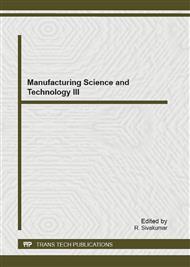[1]
K.G. Rajesh: Influence of Processing Parameters on Induced Energy, Mechanical and Corrosion Properties of FSW Butt Joint of 7475AA, Journal of Materials Engineering and Performance , (2011).
Google Scholar
[2]
D. S Carl., W. N. Tracy: Friction Stir Welding and Processing, ASM Inter. (2007).
Google Scholar
[3]
P. Cavalierea, R. Nobile: Mechanical and microstructural behaviour of 2024–7075 aluminium alloy sheets joined by friction stir welding, International Journal of Machine Tools & Manufacture 46(2006).
DOI: 10.1016/j.ijmachtools.2005.07.010
Google Scholar
[4]
S. Rajakumar, V. Balasubramanian: Multi-Response Optimization of Friction-Stir-Welded AA1100 Aluminum Alloy Joints, Journal of Materials Engineering and Performance(2011).
DOI: 10.1007/s11665-011-9979-z
Google Scholar
[5]
P. Cavaliere, A. Santis: Effect of welding parameters on mechanical and microstructural properties of dissimilar AA6082–AA2024 joints produced by friction stir welding, Materials and Design(2009).
DOI: 10.1016/j.matdes.2008.05.044
Google Scholar
[6]
H. Zhang, S. Lin: Defects formation procedure and mathematic model for defect free friction stir welding of magnesium alloy, Materials and Design (2006).
DOI: 10.1016/j.matdes.2005.01.016
Google Scholar
[7]
P. Pouya, H. Mohammad: Study on dissimilar friction stir butt welding of AA7075-O and AA2024-T4 considering the manufacturing limitation, Int. J. Adv. Manuf. Technol (2012).
DOI: 10.1007/s00170-011-3547-4
Google Scholar
[8]
L. Ceschini, I. Boromei : Effect of friction stir welding on microstructure, tensile and fatigue properties of the AA7005/10 vol. %Al2O3p composite, Composites Science and Technology (2007).
DOI: 10.1016/j.compscitech.2006.07.029
Google Scholar
[9]
Y. D., Chung, H. Fujii: Friction Stir Welding of High Carbon Tool steel (SK85) below Eutectoid Temperature, Transactions of JWRI, Vol. 38, (2009).
Google Scholar
[10]
X. Cao, M. Jahazi: Effect of welding speed on the quality of friction stir welded butt joints of a magnesium alloy, Materials and Design 30, (2009).
DOI: 10.1016/j.matdes.2008.08.040
Google Scholar
[11]
Blignault C., D.G. Hattingh: Optimizing Friction Stir Welding via Statistical Design of Tool Geometry and Process Parameters, Journal of Materials Engineering and Performance, (2011).
DOI: 10.1007/s11665-011-9984-2
Google Scholar
[12]
P. Cavalierea: Effect of welding parameters on mechanical and microstructural properties of AA6082 joints produced by friction stir welding, journal of materials processing technology 200, (2008).
DOI: 10.1016/j.jmatprotec.2007.09.050
Google Scholar
[13]
E.T. Akinlabi: Effect of Shoulder Size on Weld Properties of Dissimilar Metal Friction Stir Welds, Journal of Materials Engineering and Performance, (2011).
DOI: 10.1007/s11665-011-0046-6
Google Scholar
[14]
F.A. Ebtisam, M.A. Shahenda, S. Soher: Impact Energy of Al. Weldments Using Double Shoulder FSW, 2ndInter. Conf. on Welding Tech., Turkey(2012).
Google Scholar


